Being a parent can be very hard, but that's not an excuse to practice toxic parenting. Toxic parenting is detrimental to the child as it can tear them down and cause pain.
Living with toxic parents is a daily struggle for kids because they can do little to improve their situation. This type of relationship creates a lot of negative effects on children's emotional and physical health.
There are different types of parents and parenting styles, and most want the best for their kids. But some go over the boundaries and become toxic parents. Worse, they don't even know they're being toxic, maybe because their parents brought them up the same way. The number one way we learn to parent is from our parents and we often repeat what we learned from them.
If your parents were toxic, high are the chances that you'll be the same when it's your turn to have kids. It is usually how toxic relationships between parents and children start but it doesn't have to stay that way. When we know better, we can do better.
What is Toxic Parenting?
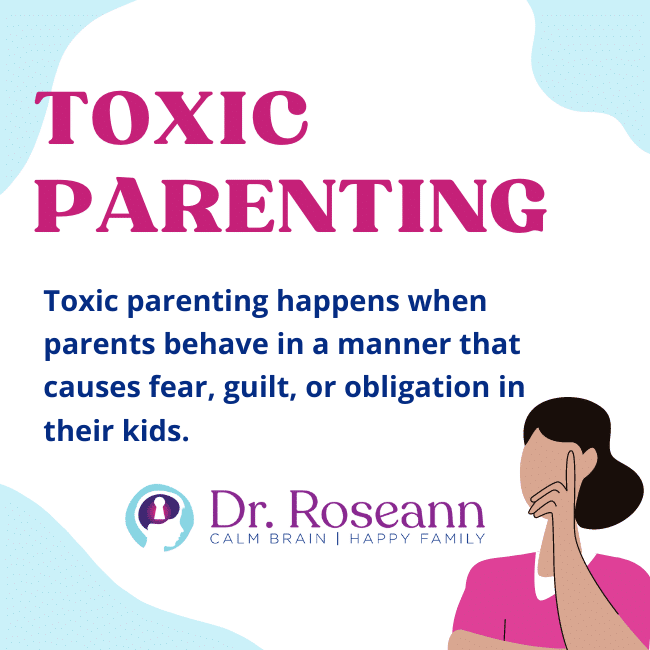
Toxic parenting happens when parents behave in a manner that causes fear, guilt, or obligation in their kids. They do this consistently, thereby negatively affecting their child's life.
When we parent with fear and guilt, it is a definite way to ruin a child's mental health. Generally speaking, toxic parents are more concerned with themselves than building close relationships with their kids. They also may be stuck and not know another way.
They spend a lot of time on themselves and don't know that it hurts and damages their children. These parents neglect and may be verbally abusive to their kids, and they aren't aware of the impact of their actions on their kids. They often think, “I turned out okay, and so will my kids.”
Signs of Toxic Parenting
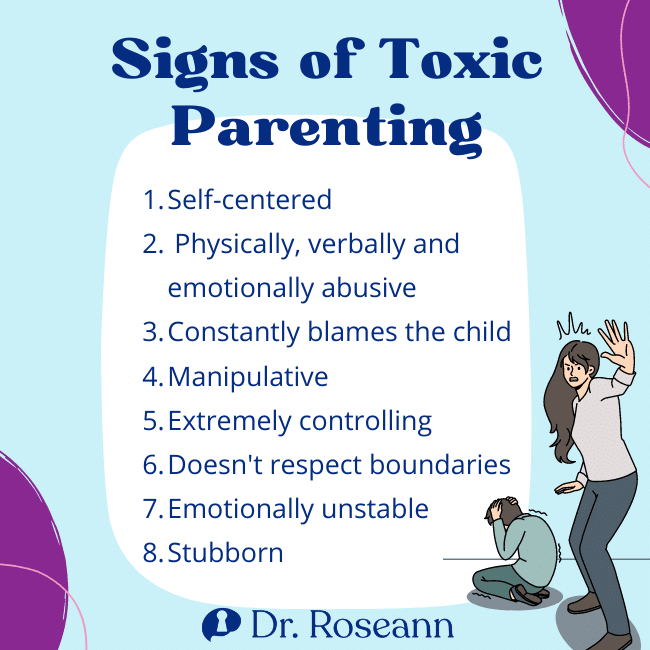
No one child would want to be around a toxic parent, as a toxic parent-child relationship is never a good thing. It can create emotional scars that children will carry their entire life. Every child deserves a good parent, but sadly, that's not always the case. Here are the unmistakable signs of toxic parenting.
#1 Self-centered
The most common sign of toxic parenting is the tendency to exhibit self-centered behaviors. Toxic parents prioritize their own needs over the needs of their children.
They are generally narcissistic, emotionally unavailable, and uncaring as far as their kids are concerned. These inadequate parents are so self-absorbed that they don't empathize with other people, including their children. These same behaviors are seen in other relationships too.
#2 Physically, verbally, and emotionally abusive
An abusive parent will give extreme punishments to their children. A good example is spanking. When their child does something wrong, they'll get hit, which teaches nothing. Often, the punishment they give is out of proportion to the little thing that the child did and is very reactive.
Verbal abuse is common with a toxic parent. It means they will yell, scream, and name-call their child for something they've done. Some parents also go the emotional abuse route, giving their children silent treatment for days as punishment for their bad behavior.
While it's unthinkable for these children to suffer abuse at the hands of their parents, it sadly happens to many children. These parents think they're giving tough love, but they're actually quite emotionally abusive.
#3 Constantly blames the child
Toxic parents always blame their children for everything wrong, including their marital problems or failed relationships. They overreact to small things that don't make sense. Children of toxic parents are expected to behave “perfectly” and that means a child has to be hypervigilant in order to avoid their parent's anger.
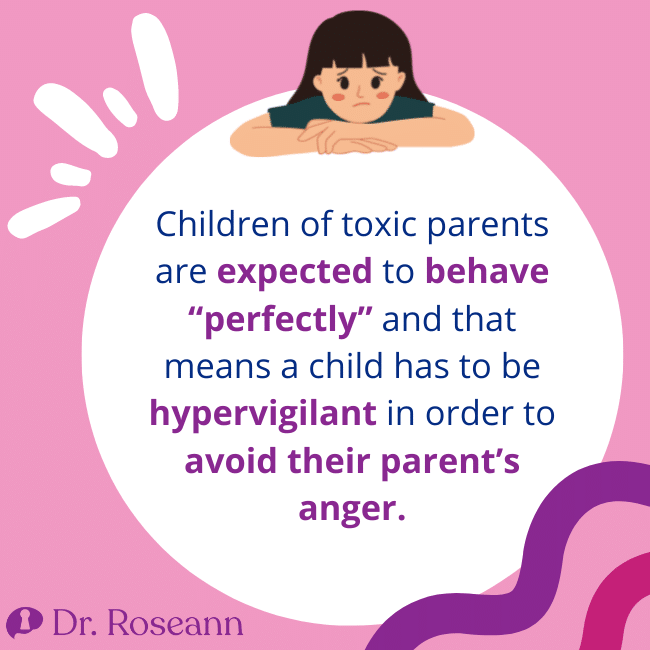
Furthermore, they would deny it's their fault and never take responsibility for their wrongdoings. Instead, such parents would blame anyone else for the hostility, turmoil, or tension at home. Sadly, that means often the child has to take the blame and that creates deep feelings of insecurity and inadequacy.
#4 Manipulative
An occasional guilt trip is common among parents, but toxic parents go way beyond that. They tend to go to extremes to get whatever they want from their children. Such parents will use shame and guilt to play with their child's own emotions.
They may even use time and money to manipulate their child. Some would play the victim or deliberately lie to sway their children's feelings and get things done their way. This incident is just one of the many examples of toxic parenting that children would pass off, thinking their parents only want the best for them.
#5 Extremely controlling
Toxic parents control their own children in many ways. They may invade their privacy or never allow them to make decisions. Some would be overly critical of their child's actions. These types of toxic parents thrive with control.
They follow the authoritarian parenting style and inculcate fear in their children to ensure they follow their rules. Such parents do this to control their children and live through them. They make decisions for their children out of their frustrations during childhood.
#6 Doesn't respect boundaries
Toxic parents push things their way. They don't recognize personal boundaries as far as their kids are concerned probably because they never had them when they were a child either.
As a result, the child will have a hard time working out things on their own because their parents are always around, refusing to give them freedom. This instance is more applicable to older children, particularly high school kids, exploring the world outside their parents' bubbles for the first time.
#7 Emotionally unstable
Most toxic parents have bad tempers, making them emotionally unstable and unpredictable. They can be very hostile and become aggressive with minimal provocation. As a result, kids with such parents feel that they're always walking on eggshells and can't make any mistakes.
Furthermore, these parents also get offended easily. They can't control their emotions if challenged, leading to reactive behaviors and emotional outbursts. This type of behavior can get children's feelings in turmoil because they will always try to please their parents, believing that will change their situation.
#8 Stubborn
Toxic parents will push their values and opinions on their kids, whatever they may be. They think their ideas are supreme and the child's point of view is always wrong. It is their way or the highway and that means little room for a child to have their own thoughts.
Toxic parents expect their children to have values and opinions like theirs. They act as if what they say is the only important thing and their children should be soldiers.
Adverse Effects of Toxic Parenting on a Child
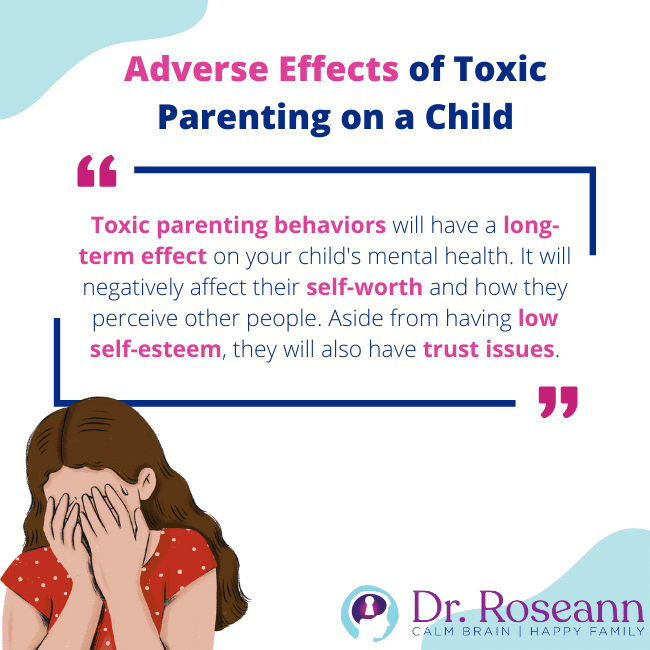
Toxic parenting behaviors will have a long-term effect on your child's mental health. It will negatively affect their self-worth and how they perceive other people. Aside from having low self-esteem, they will also have trust issues. Not just in others but they will have a hard time trusting themselves too.
In addition, these kids will have a different view of the world and personality traits different from other children. Some children can be angry and others can be extremely compliant to the point that they aren't thinking and are just following. That can result in them being prone to being in other abusive situations.
As expected, toxic parenting will immensely impact a child's development. For starters, these children will feel trapped in their own homes because they can't do anything about the ongoing abuse against them. In addition, toxic parenting may lead to various mental health conditions including anxiety and depression, or they may display behaviors that reflect dysregulation.
The research is clear that how we parent affects the child's mental health. One study looked into the relationship between dysfunctional parenting and depression. The study proposed that a child of toxic parents has unmet primary developmental needs. In addition, such kids form maladaptive views of themselves and others, making them vulnerable to developing mental or behavioral disorders in the future (Lewin et al., 2015).
Another study delved into the development of post-traumatic stress syndrome or PTSD in children living in a violent home. Children exposed to physical abuse and domestic violence undergo traumatic stress, which can lead to PTSD. Furthermore, their ongoing exposure to the violence of dysfunctional families will complicate their PTSD diagnosis even more (Margolin & Vickerman, 2007).
Ways to Correct Toxic Parenting
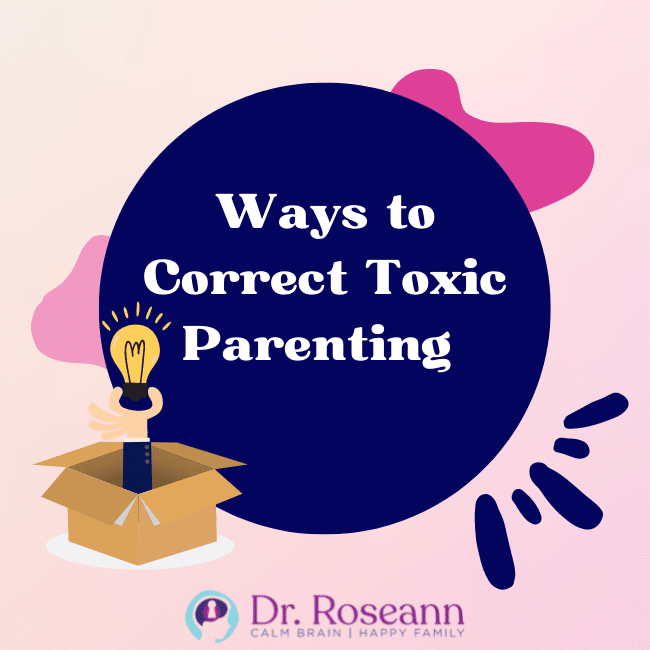
With all the bad things related to toxic parenting, there's something that you can do to correct it. The good news is most learned behaviors may be modified and unlearned. While this isn't an easy feat, it's doable.
First, recognize what has led you to such a state. Once you accept and understand what influenced your toxic behavior, you'll be able to change it.
Initiate the process of healing. Most toxic parents unknowingly become one because it's also how their parents raised them. It's the only parenting style they know, and they think it's the right one. Make that final decision to change your point of view and free yourself of negative emotions.
Look back to your childhood and find out where things have gone wrong. Then make that change in the present. List all of the things you want to change, along with some concrete steps on how to do so. Then, take it one small step at a time and constantly practice the proper behavior and adopt the positive changes you want to see.
Children of toxic parents should stop feeling guilty and start setting firm boundaries. As an adult, you no longer need to do what your parents say. Create a safe distance not just from them but also from all toxic people in your life. Ask them to treat you with respect. Set boundaries and always consider the state of your emotional health.
Self-care is also going to help a lot. Toxic parents rarely meet their child's emotional needs. So, now is the time you serve yourself first. Do the things that you love and make you happy.
Release stress in a healthy way so you can get back on track. It's always a good idea to stay clear of toxic individuals, set healthy boundaries, and maintain a good relationship with people who serve as your support system.
With parenting, you will have to start from scratch but that is okay. Start with small changes and recognize it will take a lot of effort. You will have to work to build trust and repair relationships. Look at it as an opportunity to change the course of your child's life and all future generations.
Soliciting help from mental health professionals will also help a lot. For example, a clinical psychologist or psychiatrist can address mental health issues and support those suffering from childhood trauma. With their help, healthy relationships may start and that means a healthy parenting relationship too. Talking to a close friend or being a part of a support group will also make a huge difference because you know you aren't alone.
Recognizing Toxic Family Dynamics
Recognizing toxic family dynamics is the first step towards breaking free from their grasp.
Here are common signs and characteristics of toxic family environments:
Emotional Manipulation: Toxic families often use emotional manipulation to control their members. This can include guilt-tripping, shaming, or playing the victim.
Lack of Boundaries: Healthy families have clear boundaries, but toxic families often disregard personal boundaries, invading their members' privacy and personal space.
Constant Criticism: Toxic family members may habitually criticize and belittle others, eroding their self-esteem and self-worth.
Control and Dominance: In toxic families, one or more members may exert control and dominance over others, leading to power imbalances and feelings of helplessness.
Communication Breakdown: Healthy communication is vital in any family, but toxic families often struggle with open, honest, and respectful communication.
Identifying these signs is crucial for those seeking to break free from toxic family dynamics.
Identifying Toxic Parents and Relationships
Identifying toxic parents and toxic relationships can be challenging, as toxic behavior often masks itself as concern or love. This section will help you discern when you're dealing with toxic parents or relationships:
Constant Negativity: Toxic parents may consistently focus on the negative aspects of your life, leaving you feeling unappreciated and undervalued.
Unreasonable Demands: They might make unrealistic demands or set impossible standards, leading to chronic stress and anxiety.
Emotional Manipulation: Toxic parents often use emotional manipulation tactics like guilt-tripping, gaslighting, or emotional blackmail.
Lack of Empathy: They may be unable or unwilling to empathize with your feelings or experiences, dismissing your emotions.
Repeating Patterns: Recognizing that certain behaviors repeat in your relationship with your parents can be a key indicator of toxicity.
By identifying these signs, you can begin to take steps towards healing and setting boundaries.
Dealing with Toxic Parents in Adulthood
As we move through our parenting journey, we become more aware of how we were parented. For some, we gain awareness of our own parents and their toxicity. Dealing with toxic parents in adulthood can be emotionally draining.
Common challenges adult children face from having toxic parents:
Emotional Impact: The emotional scars from childhood can persist into adulthood, affecting self-regulation, self-esteem, relationships, and mental health.
Obligation vs. Self-Care: Adult children often grapple with a sense of obligation to their parents, even when it's detrimental to their well-being.
Navigating Family Gatherings: Special occasions or family gatherings can become stressful when toxic parents are involved. Learning to navigate these situations is essential.
Parental Expectations: Toxic parents may continue to have unrealistic expectations of their adult children, causing ongoing tension and disrespectfulness.
Understanding these challenges is the first step towards finding solutions and improving your well-being.
How to Deal with Toxic Parents as Adults
When you have a toxic parent, we want to be the best parent possible for our own kids and that means we need tools to deal with them.
Here are some practical strategies for dealing with toxic parents as adults.
Set Boundaries: Establish clear boundaries to protect your emotional well-being. Communicate your boundaries calmly but firmly.
Seek Support: Reach out to friends, family members, or a therapist for support. Having a support system can make a significant difference.
Consider Therapy: Therapy can help you process your feelings, develop coping strategies, and heal from the emotional wounds of dealing with toxic parents.
Limit Contact: If necessary, consider limiting or cutting off contact with toxic parents to protect yourself from further harm. This decision should prioritize your mental and emotional health.
Calm the CNS: Calming your own brain and body is key. Using tools such as magnesium, meditation, and breathwork can help.
These practical steps can empower you to take control of your relationship with toxic parents and prioritize your well-being.
How to Cut Off Toxic Parents
Deciding to cut off ties with toxic parents is a challenging decision that requires careful consideration. When the friction or even volatility is too much, it is okay to limit or even end a relationship until the person can regulate.
This section will guide you through the process of figuring out when to end a relationship with a toxic parent:
Assess the Situation: Reflect on your relationship with your toxic parents. Are their behaviors causing you harm, and is there potential for change or reconciliation?
Seek Professional Help: Before making this significant decision, consult with a therapist or counselor who specializes in family dynamics for guidance and support.
Prepare Emotionally: Understand that cutting off toxic parents can evoke a range of emotions, including guilt, sadness, anger, and relief. These feelings are natural.
Communicate Your Decision: If you choose to cut off contact, communicate your decision clearly and calmly. You don't owe them a lengthy explanation, but you can express your need for space and emotional safety.
Create a Support Network: Ensure you have a support system in place, including friends, other family members, or a support group, to help you through this challenging time.
Making the decision to cut off toxic parents is a deeply personal choice, and this section will provide guidance for those considering it.
Citations
Lewin, M. R., Garcia, L. M., Limon, A. M., & Ojeda, A. (2015). Dysfunctional Parenting and Depression: The Mediational Role of Schemas. Journal of Experimental Psychopathology, 6(1), 2–12. https://doi.org/10.5127/jep.035513
Margolin, G., & Vickerman, K. A. (2007). Posttraumatic stress in children and adolescents exposed to family violence: I. Overview and issues. Professional Psychology: Research and Practice, 38(6), 613–619. https://doi.org/10.1037/0735-7028.38.6.613
Dr. Roseann is a parenting expert often featured in the media:
- Legal Talk Network Thanksgiving: Vaccines, Family, & Conflict Resolution
- Business Insider How to practice ‘autonomy-supported parenting' to boost your family's wellbeing
- The Week Best Parenting Advice
- Ladders Parents who raise highly resilient kids do these 4 things differently
Always remember… “Calm Brain, Happy Family™”
Are you looking for SOLUTIONS for your struggling child or teen?
Dr. Roseann and her team are all about solutions, so you are in the right place!
There are 3 ways to work with Dr. Roseann:
You can get her books for parents and professionals, including: It’s Gonna Be OK™: Proven Ways to Improve Your Child’s Mental Health, Teletherapy Toolkit™ and Brain Under Attack: A Resource For Parents and Caregivers of Children With PANS, PANDAS, and Autoimmune Encephalopathy.
If you are a business or organization that needs proactive guidance to support employee mental health or an organization looking for a brand representative, check out Dr. Roseann’s media page and professional speaking page to see how we can work together.
Dr. Roseann is a Children’s Mental Health Expert and Licensed Therapist who has been featured in/on hundreds of media outlets including The Mel Robbins Show, CBS, NBC, PIX11 NYC, Today, FORBES, CNN, The New York Times, The Washington Post, Business Insider, Women’s Day, Healthline, CNET, Parade Magazine and PARENTS. FORBES called her, “A thought leader in children’s mental health.”

She coined the terms, “Re-entry panic syndrome” and “eco-anxiety” and is a frequent contributor to media on mental health.
Dr. Roseann Capanna-Hodge has three decades of experience in working with children, teens and their families with attention-deficit hyperactivity disorder (ADHD), autism, concussion, dyslexia and learning disability, anxiety, Obsessive Compulsive Disorder (OCD), depression and mood disorder, Lyme Disease, and PANS/PANDAS using science-backed natural mental health solutions such as supplements, magnesium, nutrition, QEEG Brain maps, neurofeedback, PEMF, psychotherapy and other non-medication approaches.
She is the author of three bestselling books, It’s Gonna Be OK!: Proven Ways to Improve Your Child's Mental Health, The Teletherapy Toolkit, and Brain Under Attack. Dr. Roseann is known for offering a message of hope through science-endorsed methods that promote a calm brain.
Her trademarked BrainBehaviorResetⓇ Program and It’s Gonna be OK!Ⓡ Podcast has been a cornerstone for thousands of parents facing mental health, behavioral or neurodevelopmental challenges.
She is the founder and director of The Global Institute of Children’s Mental Health, Neurotastic™Brain Formulas and Dr. Roseann Capanna-Hodge, LLC. Dr. Roseann is a Board Certified Neurofeedback (BCN) Practitioner, a Board Member of the Northeast Region Biofeedback Society (NRBS), Certified Integrative Mental Health Professional (CIMHP) and an Amen Clinic Certified Brain Health Coach. She is also a member of The International Lyme Disease and Associated Disease Society (ILADS), The American Psychological Association (APA), Anxiety and Depression Association of America (ADAA) National Association of School Psychologists (NASP), International OCD Foundation (IOCDF).
© Roseann-Capanna-Hodge, LLC 2023
Disclaimer: This article is not intended to give health advice and it is recommended to consult with a physician before beginning any new wellness regime. *The effectiveness of diagnosis and treatment vary by patient and condition. Dr. Roseann Capanna-Hodge, LLC does not guarantee certain results.













